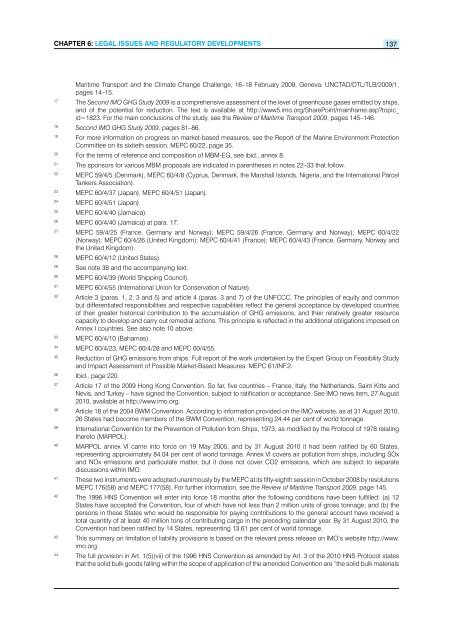Review of Maritime Transport 2010 - Unctad
Review of Maritime Transport 2010 - Unctad
Review of Maritime Transport 2010 - Unctad
You also want an ePaper? Increase the reach of your titles
YUMPU automatically turns print PDFs into web optimized ePapers that Google loves.
CHapteR 6: LeGaL issUes anD ReGULatoRY DeveLopMents 137<br />
<strong>Maritime</strong> <strong>Transport</strong> and the Climate Change Challenge, 16–18 February 2009, Geneva. UNCTAD/DTL/TLB/2009/1,<br />
pages 14–15.<br />
17 The Second IMO GHG Study 2009 is a comprehensive assessment <strong>of</strong> the level <strong>of</strong> greenhouse gases emitted by ships,<br />
and <strong>of</strong> the potential for reduction. The text is available at http://www5.imo.org/SharePoint/mainframe.asp?topic_<br />
id=1823. For the main conclusions <strong>of</strong> the study, see the <strong>Review</strong> <strong>of</strong> <strong>Maritime</strong> <strong>Transport</strong> 2009, pages 145–146.<br />
18 Second IMO GHG Study 2009, pages 81–86.<br />
19 For more information on progress on market-based measures, see the Report <strong>of</strong> the Marine Environment Protection<br />
Committee on its sixtieth session. MEPC 60/22, page 35.<br />
20 For the terms <strong>of</strong> reference and composition <strong>of</strong> MBM-EG, see ibid., annex 8.<br />
21 The sponsors for various MBM proposals are indicated in parentheses in notes 22–33 that follow.<br />
22 MEPC 59/4/5 (Denmark), MEPC 60/4/8 (Cyprus, Denmark, the Marshall Islands, Nigeria, and the International Parcel<br />
Tankers Association).<br />
23 MEPC 60/4/37 (Japan), MEPC 60/4/51 (Japan).<br />
24 MEPC 60/4/51 (Japan).<br />
25 MEPC 60/4/40 (Jamaica).<br />
26 MEPC 60/4/40 (Jamaica) at para. 17.<br />
27 MEPC 59/4/25 (France, Germany and Norway); MEPC 59/4/26 (France, Germany and Norway); MEPC 60/4/22<br />
(Norway); MEPC 60/4/26 (United Kingdom); MEPC 60/4/41 (France); MEPC 60/4/43 (France, Germany, Norway and<br />
the United Kingdom).<br />
28 MEPC 60/4/12 (United States).<br />
29 See note 38 and the accompanying text.<br />
30 MEPC 60/4/39 (World Shipping Council).<br />
31 MEPC 60/4/55 (International Union for Conservation <strong>of</strong> Nature).<br />
32 Article 3 (paras. 1, 2, 3 and 5) and article 4 (paras. 3 and 7) <strong>of</strong> the UNFCCC. The principles <strong>of</strong> equity and common<br />
but differentiated responsibilities and respective capabilities reflect the general acceptance by developed countries<br />
<strong>of</strong> their greater historical contribution to the accumulation <strong>of</strong> GHG emissions, and their relatively greater resource<br />
capacity to develop and carry out remedial actions. This principle is reflected in the additional obligations imposed on<br />
Annex I countries. See also note 10 above.<br />
33 MEPC 60/4/10 (Bahamas).<br />
34 MEPC 60/4/23, MEPC 60/4/28 and MEPC 60/4/55.<br />
35 Reduction <strong>of</strong> GHG emissions from ships: Full report <strong>of</strong> the work undertaken by the Expert Group on Feasibility Study<br />
and Impact Assessment <strong>of</strong> Possible Market-Based Measures. MEPC 61/INF.2.<br />
36 Ibid., page 220.<br />
37 Article 17 <strong>of</strong> the 2009 Hong Kong Convention. So far, five countries – France, Italy, the Netherlands, Saint Kitts and<br />
Nevis, and Turkey – have signed the Convention, subject to ratification or acceptance. See IMO news item, 27 August<br />
<strong>2010</strong>, available at http://www.imo.org.<br />
38 Article 18 <strong>of</strong> the 2004 BWM Convention. According to information provided on the IMO website, as at 31 August <strong>2010</strong>,<br />
26 States had become members <strong>of</strong> the BWM Convention, representing 24.44 per cent <strong>of</strong> world tonnage.<br />
39 International Convention for the Prevention <strong>of</strong> Pollution from Ships, 1973, as modified by the Protocol <strong>of</strong> 1978 relating<br />
thereto (MARPOL).<br />
40 MARPOL annex VI came into force on 19 May 2005, and by 31 August <strong>2010</strong> it had been ratified by 60 States,<br />
representing approximately 84.04 per cent <strong>of</strong> world tonnage. Annex VI covers air pollution from ships, including SOx<br />
and NOx emissions and particulate matter, but it does not cover CO2 emissions, which are subject to separate<br />
discussions within IMO.<br />
41 These two instruments were adopted unanimously by the MEPC at its fifty-eighth session in October 2008 by resolutions<br />
MEPC 176(58) and MEPC 177(58). For further information, see the <strong>Review</strong> <strong>of</strong> <strong>Maritime</strong> <strong>Transport</strong> 2009, page 145.<br />
42 The 1996 HNS Convention will enter into force 18 months after the following conditions have been fulfilled: (a) 12<br />
States have accepted the Convention, four <strong>of</strong> which have not less than 2 million units <strong>of</strong> gross tonnage; and (b) the<br />
persons in these States who would be responsible for paying contributions to the general account have received a<br />
total quantity <strong>of</strong> at least 40 million tons <strong>of</strong> contributing cargo in the preceding calendar year. By 31 August <strong>2010</strong>, the<br />
Convention had been ratified by 14 States, representing 13.61 per cent <strong>of</strong> world tonnage.<br />
43 This summary on limitation <strong>of</strong> liability provisions is based on the relevant press release on IMO’s website http://www.<br />
imo.org.<br />
44 The full provision in Art. 1(5)(vii) <strong>of</strong> the 1996 HNS Convention as amended by Art. 3 <strong>of</strong> the <strong>2010</strong> HNS Protocol states<br />
that the solid bulk goods falling within the scope <strong>of</strong> application <strong>of</strong> the amended Convention are “the solid bulk materials

















